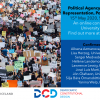
Liam O’Farrell considers the effects of Covid-19 on civic engagement: Will the pandemic make authorities more interested in digital public consultation?
Given that Covid-19 has only recently become part of our lives, there has not yet been a systematic review of how organisations and governments have changed their approaches to engaging with the public in response to the pandemic. This also reflects the uncertainty of knowing when things will return to normal, or how working and living habits will look afterwards. However, there is anecdotal evidence that organisations are becoming more interested in digital methods as a means of engaging the public in a socially distanced way.
We now stand at a crossroads. Civic engagement, devolution of power, and deliberative democracy are tools that we know can work to rebuild the legitimacy of political institutions that have been much undermined in many Western democracies. Handling the pandemic means requiring citizens to trust in the information that they receive from officials, and also for governments to use impartial, reliable figures and evidence-based advice. This is an opportunity to reset the moves towards ‘fake news’ that have been much documented in recent years.
Although it may seem counter-intuitive, Covid-19 presents a good opportunity for developing civic engagement strategies. Firstly, organisations have a chance to pause, reflect on established practices, and think critically about what needs to change. Secondly, there has been a tremendous flourishing of communal trust and interconnectedness. This moment of focus on social solidarity is an ideal period to attempt to reconnect the public with public institutions, and to also think about how power and resources are distributed in our societies.
Research in China has shown that, in the context of Covid-19, governments can use social media for citizen engagement that positively affects trust through dialogue and sharing of the latest information. Contrary to conventional views of Chinese social media as being sites of self-censorship and surveillance, the latest research has found that citizens have used the platforms for active engagement, including claim-making and negotiation with authorities. In the Western context, where free speech is seen as a fundamental right, individuals may feel able to be more critical of government information than the average user of a Chinese social media platform. There is a dark side, however, with individuals able to make false claims and the potential for hostile powers to undermine electoral processes with disinformation.
The pandemic has shown the importance of channels of communication between citizens and authorities, and the extent to which a functioning society relies on neglected values such as solidarity. In order to successfully overcome the pandemic, there needs to be a mutual relationship of trust between citizens and authorities. Civic engagement can achieve this, helping to develop holistic policy interventions and collaboratively identify needs and solutions. Covid-19 also provides the opportunity to introduce new, more unifying political narratives and rebuild trust through the use of credible, nonpartisan knowledge, along with the centring of experts over vocal populists who rely on emotion rather than facts.
Another important recent change with important political effects has been the renewed focus on the structural inequalities facing black people as a result of the Black Lives Matter protests. This is an opportunity for local and national governments, as well as agencies and organisations outside of government, to work alongside communities to tackle the ongoing discrimination that ethnic minority citizens face and work in partnership to develop an inclusive vision for the future.
Engaging with the issue of inclusion is one of the key areas of debate in contemporary civic engagement literature and research: namely, how far and by what mechanisms can we ensure a diverse range of views are represented in decision-making? For example, research on digital democracy has found that marginalised groups (e.g. ethnic minorities) continue to struggle to make their voices heard, or even contribute at all, in digital engagement spaces. Issues that women care about receive less attention in participatory budgeting processes than those championed by male participants, leading to calls for feminist principles of participatory budgeting to be developed. Similar problems are found in urban planning, where spaces are designed by the largely male practitioners of this field without consideration of how differently men and women experience space. The result is that women can feel unsafe using the spaces in our cities.
A further issue is the notion of cognitive diversity, an emerging and contentious area of research in this field. The question remains on the extent to which the views of those who think differently – from left-wing anarchists to far-right nationalists – can and should be incorporated into civic engagement and contingent structures of democratic deliberation. Indeed, is there a need for such ‘cognitive diversity’ at all, or does this undermine efforts to draw attention to the voices of groups that experience discrimination? Moreover, what limits can reasonably be placed upon speech and public discourse in such forums, if any at all?
This short article is an excerpt from Liam’s new report for the DCD: States of participation: international best practice in civic engagement. Download it by clicking here.






















This also reflects the uncertainty of knowing when things will return to normal,